Growing Lettuce, Carrots, and More Four Stories Up
BU Community Gardens club teaches tips and tricks of urban gardening
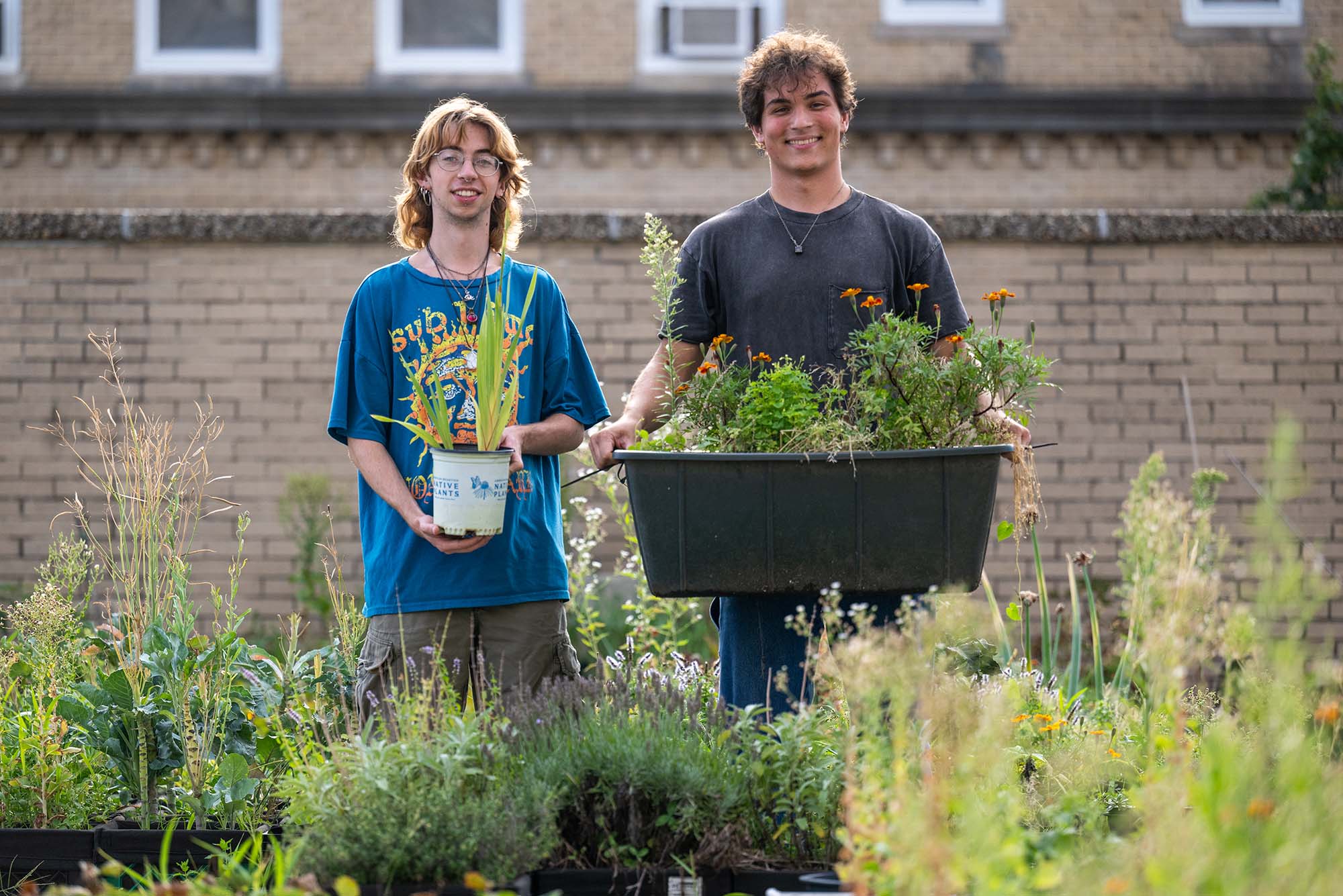
Club president Austin Bellis (CAS’26) (left) and secretary Grant Haas (CAS’25) with their recent bounty.
Growing Lettuce, Carrots, and More Four Stories Up
BU Community Gardens club teaches tips and tricks of urban gardening
Lush lettuce overflows from planters. Ripe cherry tomatoes hang from green vines. And tall grasses blow gently in a breeze coming off the Charles.
This idyllic-sounding oasis isn’t visible to pedestrians on Comm Ave. It requires two escalators up to a Warren Towers rooftop patio, where the BU Community Gardens club has cultivated a small urban garden where dozens of different vegetables and herbs flourish. Depending on the season, members grow lettuce, raspberries, strawberries, beets, string beans, zucchini, carrots, mint, thyme, broccoli, kale, garlic, tomatoes, onions, and sunflowers.
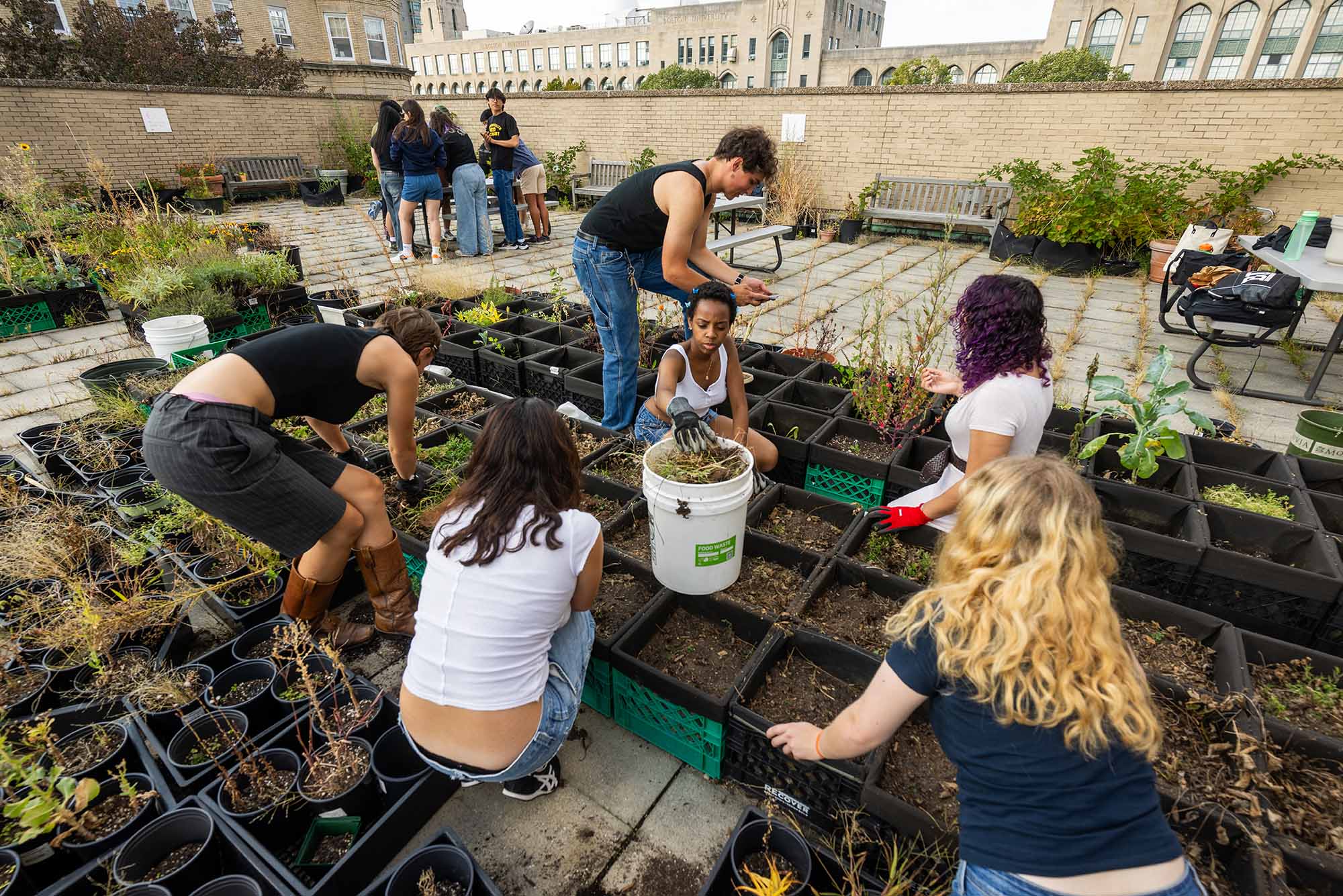
They’ve laid claim to most of the roof’s space. Clay pots are grouped in clusters, while a hydroponic planter is off to one corner. In the middle are rows of neatly lined black milk crate planters stretching across the patio.
Club secretary Grant Haas (CAS’25) says that despite the urban setting, growing conditions on Warren’s patio rooftop are surprisingly favorable. “It’s really not much different from your regular sort of gardening,” he says, even though a blustery wind is sometimes strong enough to blow pots and milk crates over.
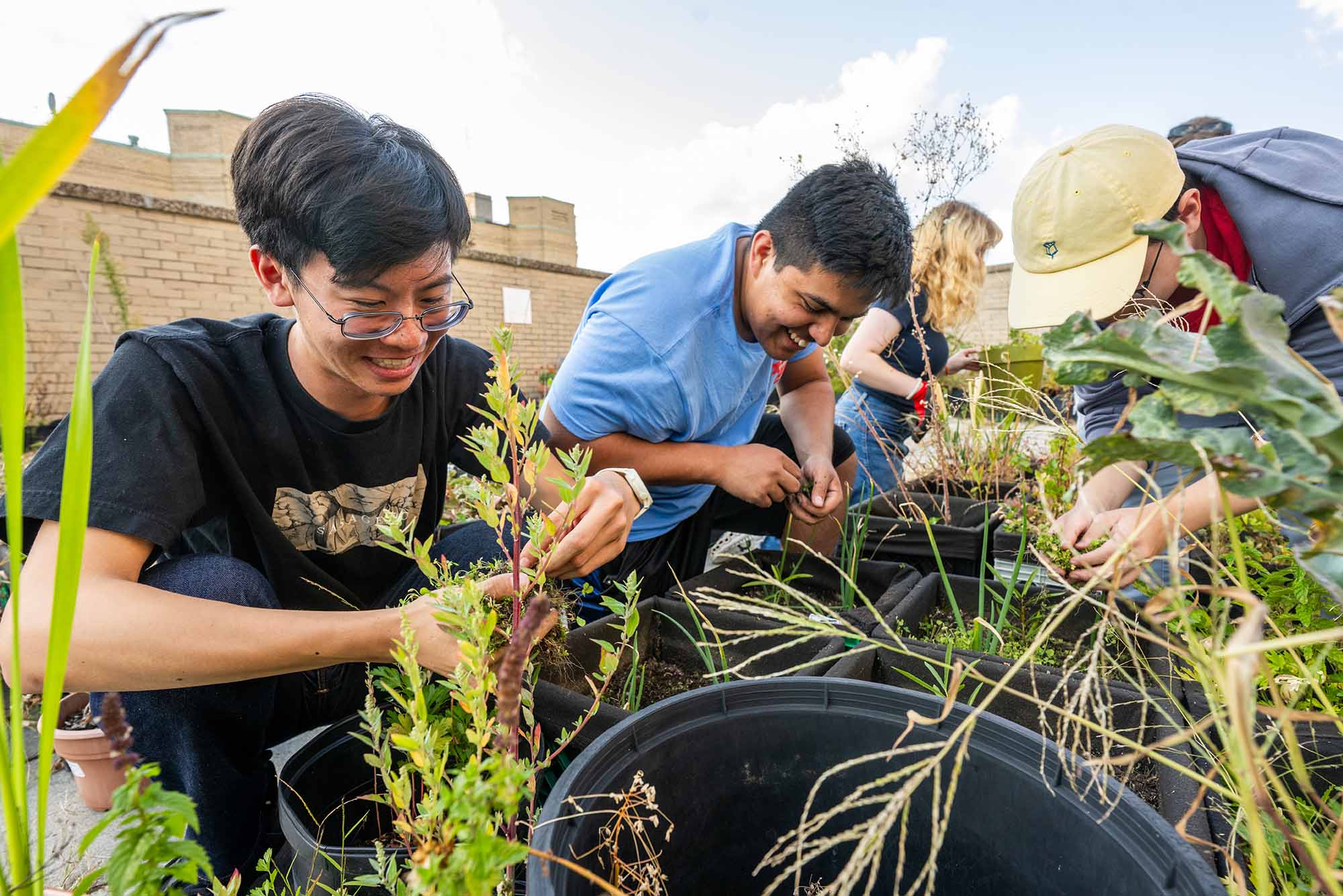

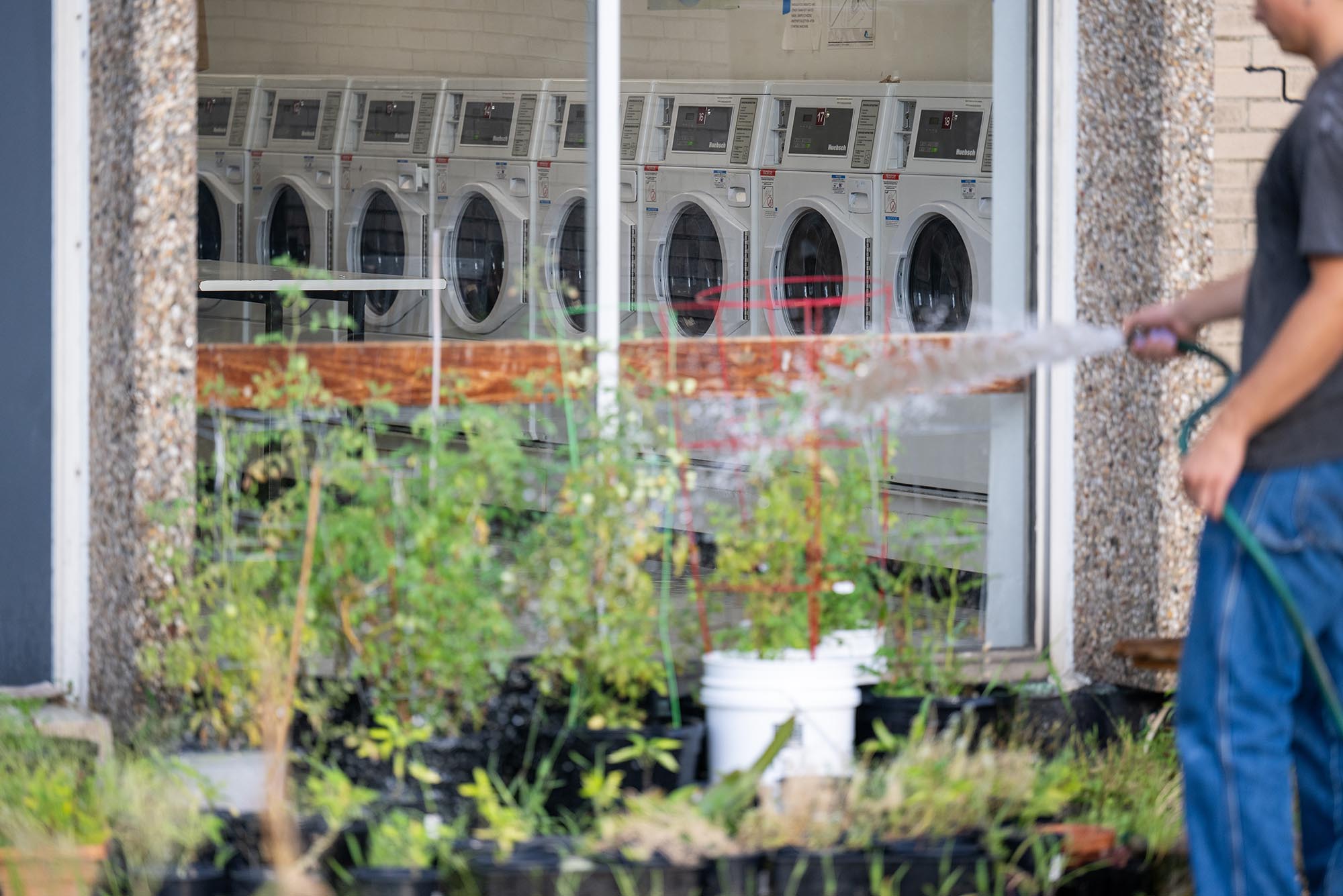
Aaron Lin (ENG’28) (from left), Alan Boniloa (ENG’28), and Nelson Cao (CAS’27) are all smiles despite tasked with weeding. The club’s grows dozens of fruits and veggies, including beets.
The project was originally launched a few years ago by classmates Sidney Hare (CAS’22) and Stella Dzialas (CAS’24), with help and mentorship from BU Sustainability and Campus Climate Lab. The two had the original vision of transforming the Warren Towers space, previously just an empty patio and some tables. The Community Gardens club took over the project in 2022.

In addition to the rooftop space, the club maintains two other gardens: 150 Riverway on the Fenway Campus (with a greenhouse that can be used in the winter) and another in the Fenway Victory Gardens, adjacent to the Muddy River.
The members say all three gardens offer a refuge from their cramped dorms and apartments and their hectic schedules. Warren has a half wall around the patio’s perimeter, which blocks out the view of the traffic below but does little to mitigate the sounds of the trolley, cars, and sirens whizzing down the avenue below. For this reason, club treasurer Chris Bronson (CAS’25) says, his favorite spot is the Victory Gardens. It involves working in the earth (versus in planters) and offers a chance to see what other gardeners are growing.
Haas and club president Austin Bellis (CAS’26) were the only club members on campus this summer, so they were tasked with all the upkeep. Haas, an environmental science major, and a zero-waste intern for BU Sustainability, says he aimed to get up to the Warren Towers garden four or five times a week for an hour-long watering session, given the summer’s record heat. But the two were happy to share the watering, weeding, and harvesting duties again once club members returned this fall.
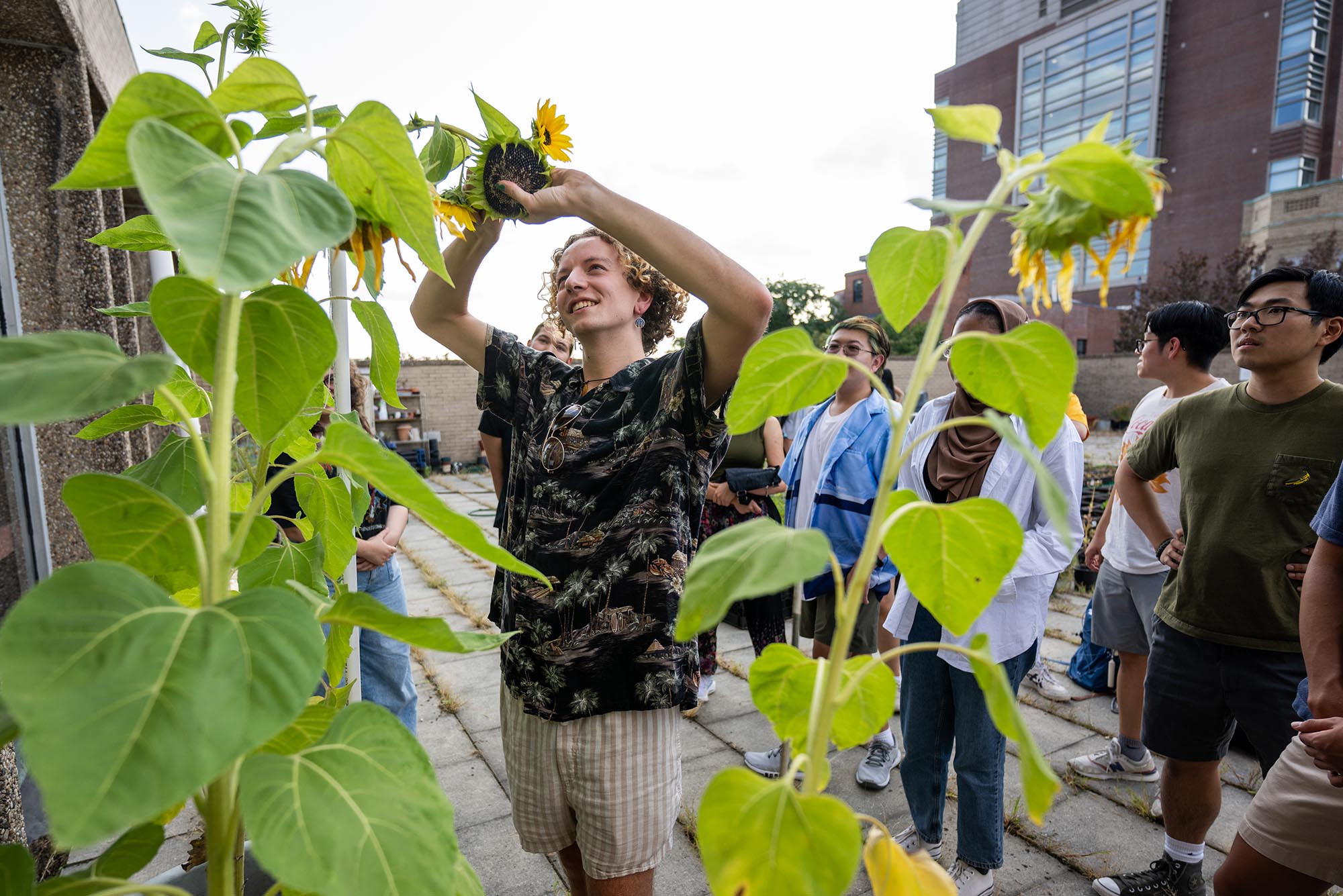
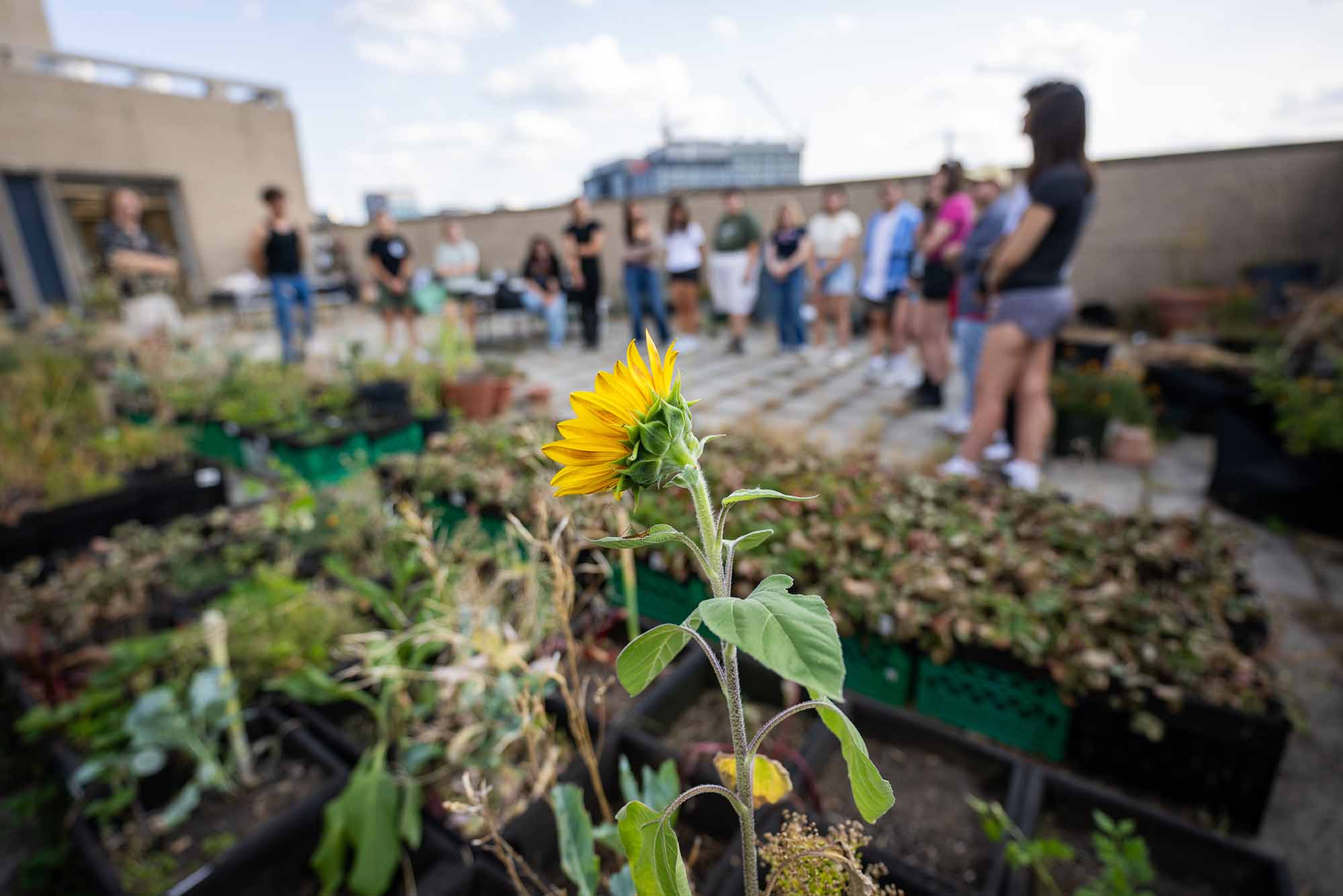
BU Community Gardens Club treasurer Chris Bronson (CAS’25) (left) removes the heads of sunflowers to harvest the seeds.
The club embraces the mantra “the more, the merrier.” When five cubic yards of soil were delivered on a side street below this past spring, the e-board didn’t hide the fact that the next meeting would include some manual labor. “I would invite friends to attend a meeting,” Bellis says with a laugh, “but tell them to meet me down by the dirt pile first so they could help lug it up.”
At this semester’s second meeting, about 15 club members gathered to spread compost around the planters and harvest whatever was ready. The fruits of their labor resulted in a snack: a spicy homemade salsa made by Cam Eckerman (CAS’27), who used her family recipe, showing off Warren Garden’s fresh tomatoes and cilantro. Asked what she’s enjoyed most about being part of the club: “It’s a supportive community,” Eckermanshe says. “Urban agriculture has a learning curve, so if it is someone’s first time gardening, they’re happy to teach you.”


Tomatoes and green beans poke through.
One goal of the club is to donate their produce to BU’s dining halls, which Haas acknowledges is a bit tricky to navigate since it requires learning the ins-and-outs of food safety standards. In the meantime, they are looking into donating to local food banks. They’re even considering setting up a stand along Comm Ave and giving away the produce to anyone who wants it. In the meantime, they hand out their crops to members, and meetings sometimes include “salad parties,” with greens harvested from the three locations.
Haas says he’s learned a ton being a member of the club. He fell into gardening helping his mom back home, but his role now means he does more long-term planning—he’s had to learn the ideal time to plant, when produce ripens, and when to harvest. In the coming winter months, with little produce to tend to, the club is planning bimonthly information sessions on topics like urban agriculture and food science.
Asked what he likes about gardening, Haas says he it’s “the peace of it, I can zone out a little,” adding, “It’s also a great way to connect with nature in an urban environment. That’s obviously a huge appeal, I think, to anyone who doesn’t know anything about gardening—just being able to come up to this space to relax. And I like how there is a new challenge to explore every day.”
Interested in becoming a member of the BU Community Gardens club? Check the group’s Instagram page for the next meetup.


Comments & Discussion
Boston University moderates comments to facilitate an informed, substantive, civil conversation. Abusive, profane, self-promotional, misleading, incoherent or off-topic comments will be rejected. Moderators are staffed during regular business hours (EST) and can only accept comments written in English. Statistics or facts must include a citation or a link to the citation.